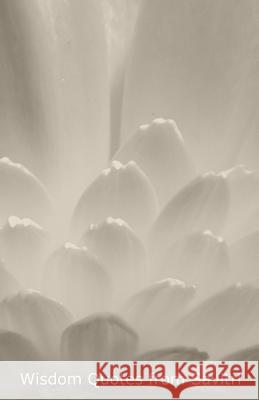Wisdom Quotes from Savitri » książka
Wisdom Quotes from Savitri
ISBN-13: 9781480261570 / Angielski / Miękka / 2012 / 186 str.
It may not be a wise proposition to speak of Wisdom Quotes based on Sri Aurobindo's epic Savitri. Certainly it cannot be in any conventional or conformist sense. This is particularly important when we recognize that his Savitri is a supreme revelation, is a presentation of his epochal realizations, that it is a Yogi-Poet's luminous vision and work, that it embodies in itself the abounding omniscient Word coming from some high transcendental Source. Therefore to reduce or present Savitri in terms of quotes could easily amount to its trivialization. There is a danger in it. Yet there are on occasions wonderful crimson seeds of exceptional quality and distinction which stand out in their flowering possibilities to give rise to new life and zest and pursuit, of truth and beauty, as much as of power and light and joy. This could be encouraging to us. We have attempted here a selection in the manner of aphoristic quotations, of single-lines, unrhymed couplets and quatrains or stanzas. No doubt, in the poem these occur naturally in their substantial richnesses, exist with their vivid textual background and relevance, in their respective fitting contexts; isolating them from it might therefore appear somewhat unusual or atypical if not weird. Yet they do carry in them a firm and forceful universality which is context-free, which is what aphorismos is. In the present work these have been put in the running sequence as they appear in the main body of the poem. It must also be pointed out that there are quite a number of lines or passages of various lengths which could have been valuably included in any proper representative book of quotations; however, this is generally ruled out because of the indicative pronominal references in them which do not easily lend themselves to form a part of an unbounded set. Here are some examples illustrating their character: In atomic parcellings of the Infinite Near to the dumb beginnings of lost Self, He felt the curious small futility Of the creation of material things. When all thy work in human time is done, The mind of earth shall be a home of light, The life of earth a tree growing towards heaven, The body of earth a tabernacle of God. But where the silence of the gods had passed, A greater harmony from the stillness born Surprised with joy and sweetness yearning hearts, An ecstasy and a laughter and a cry. Night felt assailed her heavy sombre reign; The splendour of some bright eternity Threatened with this faint beam of wandering Truth Her empire of the everlasting Nought. O human copy and disguise of God Who seekst the deity thou keepest hid And livest by the Truth thou hast not known, Follow the world's winding highway to its source. The Enigma ceased that rules our nature's night, The covering Nescience was unmasked and slain; Its mind of error was stripped off from things And the dull moods of its perverting will. There are in these stanzas pithy concise statements with their universal implications. Thus in "O human copy and disguise of God, / Follow the world's winding highway to its source" is full of desirable instructions and can be a good guide to shape one's life and movement in its truth. But that would be another matter. Here our aim is, apart from for one or two exceptions, to go in the strictness of the original text."
Zawartość książki może nie spełniać oczekiwań – reklamacje nie obejmują treści, która mogła nie być redakcyjnie ani merytorycznie opracowana.











